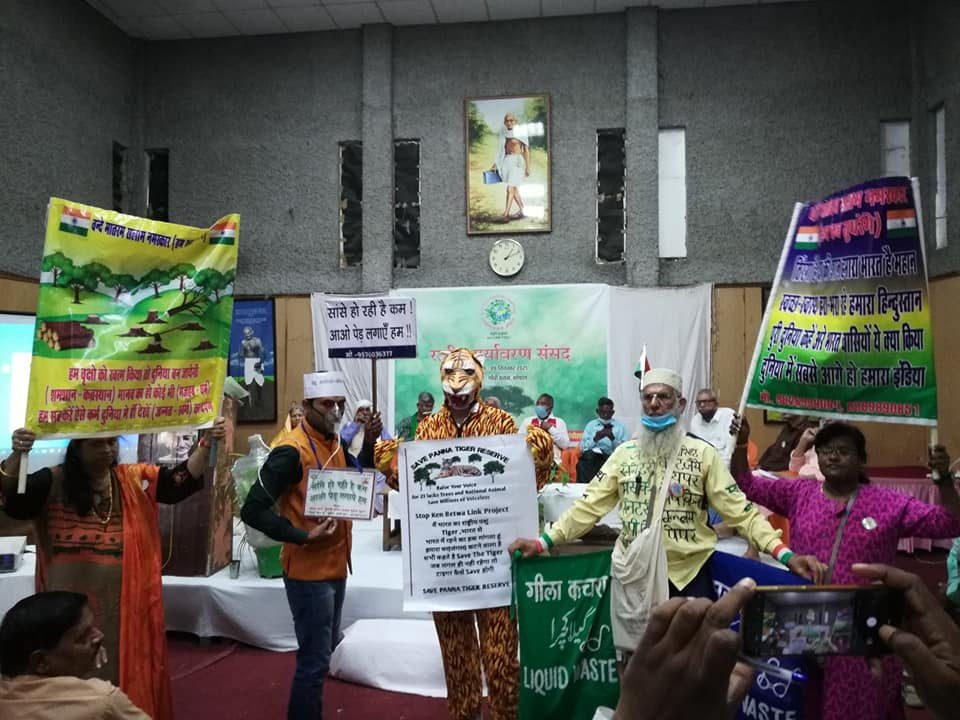‘Environment Parliament’ Calls For Sustainable Growth
Sep 11, 2021 | Shalini Rai
The first-of-its-kind Parliament was attended by Padma Shri Jadav Payeng of Assam, Narmada Bachao Andolan founder Medha Patkar, environmental activist Amit Bhatnagar, former MLA Dr Sunilam and several other prominent figures
A National ‘Environment Parliament’ was held in Bhopal on Thursday to shine a light on the importance of sustainable growth in minimising environmental destruction and ensuring a safer future for the coming generations.
The first-of-its-kind Parliament was attended by Padma Shri Jadav Payeng of Assam, Narmada Bachao Andolan founder Medha Patkar, environmental activist Amit Bhatnagar, former MLA Dr Sunilam and several other prominent figures.
Jadav Payeng, born in the indigenous ‘Mising’ Tribe of Assam, is an environmental activist and forestry worker who is also known as the Forest Man of India. Payeng has to his credit a forest reserve spanning an area of over 550 hectares in Assam’s Jorhat area, which he has developed over the past few decades.
During the Parliament session, environment enthusiasts also discussed Environmental Impact Assessment and its lacunae. Also finding prominent place was the aim of safeguarding the forests of Buxwaha and preventing the felling of lakhs of trees under the Ken–Betwa river linking project.
Environmental activists from across the country joined in the Parliament session by means of video-conferencing in the post-lunch session.
In his address at the conclave, Bhopal-based green activist Dr Subhas C Pandey, quoting a research paper published in 2016, shared the alarming data that if things remain as they are, Bhopal city’s total green cover — which stood at 66% in 1990 — will deplete to a meagre 4% by 2025. Dr Pandey said, “Going by the prevailing circumstances in the city, the outcome only seems an understatement.”
Increased pollution, depleted groundwater level, hampered ecology and reduced oxygen percentage in air has caused irreparable harm to Bhopal’s ecosystem, added the environment researcher. The Smart City project, too, has proved to be a menace for the city’s green cover.
Meanwhile, Paryavaran Bachao Abhiyan convener Sharad Sigh Kumre said that besides drawing up a strategy for saving over 25 lakh trees, which are facing the axe in the Ken-Betwa river link project and the Buxwaha diamond mining project in MP’s Chhatarpur district, a session was set aside specifically for political figures so that their stand on the environmental issues could be clarified.
“Besides saving the greenery, we will be devising a strategy for safeguarding the Stone Age culture and rock paintings that exist in the forests of Buxwaha. Around 382-hectare area of the forest in Bundelkhand region is being leased out to an Aditya Birla group company for the excavation of diamonds,” he said. “The mass destruction of forests is planned even though the area falls under an arid zone in Bundelkhand,” said Kumre, pressing for revision of developmental policies in line with environmental hazards.
A group of volunteers from MP and other states — under the aegis of the Paryavaran Bachao Samiti — are running a campaign to save 2.25 lakh trees in Buxwaha and around 23 lakh trees which are under threat due to the Ken–Betwa river link project.
Amit Bhatnagar, an activist involved with the Save Buxwaha Project, claimed that the local people don’t want diamond mining and are in favour of saving the vast natural forest which faces the axe due to the project in the area.
Environmentalists at this ‘Parliament’ claimed that the government should consider the use of technology to produce diamonds artificially and there is no need to destroy a vast flourishing forest for this purpose. Activist Anand Patel said that naturally-grown vast forests like Buxwaha can’t be re-planted by humans and have a unique environmental significance.
The ambitious Ken-Betwa river link project — that is expected to be inaugurated ahead of the UP assembly polls — also resonated at the event, with Bhatnagar saying that as an alternative, traditional water bodies could be revived to address the issue of water scarcity in Bundelkhand.
The participants of the ‘Environment Parliament’ demanded sustained and planned growth for a safe and secure future. They also adopted a resolution to save the environment and strongly urge policymakers to make meaningful changes to the status quo.
